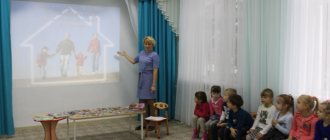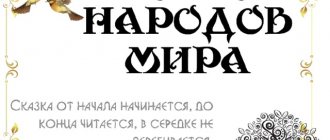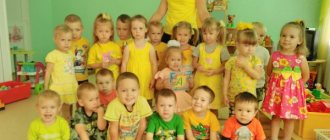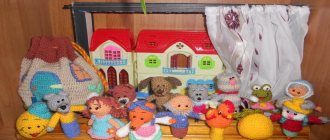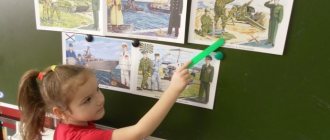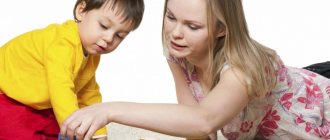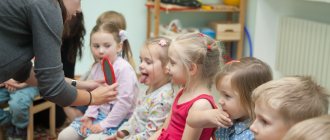Project “Visiting a Fairy Tale”
- May 6, 2016
Conference “Project activity in an educational institution - 2016”
Nomination “Pedagogical project in a preschool institution”
“Thanks to a fairy tale, a child learns about the world not only with his mind, but also with his heart.” V.A. Sukhomlinsky
A fairy tale is a necessary element of a child’s spiritual life. Entering the world of miracles and magic, the child plunges into the depths of his soul. Fairy tales, introducing children to the circle of extraordinary events and transformations that occur with their heroes, express deep moral ideas. They teach kindness towards people, show high feelings and aspirations. Meeting children with fairy tale heroes will not leave them indifferent. As a result of empathy, the child acquires not only new knowledge, but also, most importantly, a new emotional attitude towards the environment: people, objects, phenomena. From fairy tales, children draw a lot of knowledge: their first ideas about time and space, about the connection between man and nature, the objective world.
The “Visiting a Fairy Tale” project is carried out as an exciting, playful, creative activity aimed at enhancing communication between children and adults. An integrated approach allows you to develop in unity the child’s speech, cognitive activity, creativity, communication skills, and emotional responsiveness.
The project is aimed at nurturing a love for fairy tales and developing the creative abilities of preschoolers through organizing joint activities between children and adults (parents, teachers).
Statement of the problem: nowadays, most children are brought up not on fairy tales, but on modern cartoons. Most parents don't have time to sit down with their child and read a book. Child psychologists consider this a big omission of adults in raising their children.
Data obtained during a survey of preschool children and parents indicate that very little time is devoted to reading children's books at home. But in fact, a fairy tale is one of the most ancient means of moral and aesthetic education, and also forms the behavioral stereotypes of future members of adult society. Therefore, we decided to devote a little more time to fairy tales in the development and upbringing of our children.
Justification of the problem: adults (parents, teachers) do not give due importance to the important role of fairy tales in raising children.
The relevance of the project is determined by the fact that its implementation includes the use of various forms of joint activities of children and adults (teachers, parents): a family creative competition of fairy tales of their own composition “Once upon a time ...”, theatrical creative performances by teachers of the preschool educational institution “Parade of Fairy Tales”.
The novelty of the project lies in the use of various types of joint creative activities of children and adults.
Project goal: revealing the value of joint creativity of project participants through the development of sustainable interest in a fairy tale as a work of art, creating conditions for the realization of the creative potential of project participants.
Project objectives:
for children:
- develop the ability to expressively read poetry, dramatize episodes of fairy tales;
- enrich and expand children's vocabulary;
- develop imaginative thinking, imagination, and creative abilities in children;
- develop children’s communicative competence and the ability to communicate with adults in different situations;
- cultivate feelings of friendship and collectivism.
- cultivate a culture of speech,
for parents:
- creating favorable conditions in the family for the development of the child, taking into account the children’s experience acquired in kindergarten;
- development of joint creativity between parents and children;
- develop in parents the ability to see the child as an individual, respect his opinion, and discuss upcoming work with him;
- to interest parents in the life of the group and kindergarten, to arouse a desire to participate in it;
for teachers:
- development of the child’s creative potential;
- show parents the knowledge and skills children acquired during the project.
The project is short-term , its implementation is designed for 2 months (March-April).
Project participants: students (pupils of preschool educational institutions), parents (legal representatives), teaching staff of preschool educational institutions.
The project is built on the following general didactic principles: accessibility, age-appropriateness, purposefulness, variability, scientific character, participation of interested parties.
The project schedule is built in 3 stages:
- preparatory , which includes interviewing children and parents, drawing up a work plan;
- the main one, during which the joint work of project participants is carried out according to the plan,
- the final stage, where project participants summarize the experience gained and broadcast it to society.
Project resources:
| Human resources | Teachers: group teachers, specialists (music director, physical education instructor, speech therapists) Administration of the preschool educational institution: head, deputy heads Parents of students |
| Materially technical resource |
|
| Informational resource |
|
Expected results:
For children:
- developing children's interest in fairy tales;
- consolidating the ability to apply one’s knowledge in conversation and coherent statements;
- fostering a sense of friendship and collectivism;
- get an emotional response from your work.
For teachers:
- design of a common book of fairy tales based on the results of a creative family competition of fairy tales of one’s own composition “Once upon a time...”;
- producing joint creative works with children and parents;
- project presentation;
- formation of a desire to continue project activities;
- design of the project.
For parents:
- meaningful time spent with the child, desire to take part in joint activities, common interests;
- increasing the level of awareness of parents about the activities of preschool educational institutions;
- strengthening parent-child relationships.
Project “Visiting a Fairy Tale”
Author: Evgenia Pavlovna Mitkina, deputy head of the municipal budgetary preschool educational institution of the municipal formation "City of Arkhangelsk" Combined kindergarten No. 96 "Sosenka" (1st qualification category for the position of "teacher", teaching experience 6.5 years).
Visiting a fairy tale: project
Martynenko N.G., Tolstykh T.V. Visiting a fairy tale: project // Owl. 2020. N1 (19). URL: https://kssovushka.ru/zhurnal/19/ (date of access: 10.10.2020).
Order No. 529333
Project passport:
Project title: “Visiting a fairy tale”
Authors of the project: Natalia Gennadievna Martynenko, Tatyana Vladimirovna Tolstykh – educators.
Type of project: role-playing - gaming, creative.
Project implementation period : medium term (2019 – 2020)
Project participants: young children, teachers, parents, musicians. worker, physical worker, iso. worker.
Base, project implementation: MBDOU DS "Kalinka", Volgodonsk.
Relevance: Early preschool age is the most favorable period for the comprehensive development of a child. At 3-4 years old, children actively develop all mental processes: perception, attention, memory, thinking, imagination and speech. During this same period, the formation of basic personality qualities occurs. Therefore, none of the children's ages requires such a variety of means and methods of development and education as the younger preschool age.
One of the most effective means of developing and educating a child in early preschool age is theater and theatrical games. Play is the leading activity of preschool children, and theater is one of the most democratic and accessible forms of art, which allows solving many pressing problems of pedagogy and psychology related to artistic and moral education, the development of personal communicative qualities, the development of imagination, fantasy, initiative and etc.
The educational possibilities of theatrical activities are wide. By participating in it, children get acquainted with the world around them through images, colors, sounds, and skillfully posed questions force the children to think, analyze, draw conclusions and generalizations. Improvement of speech is also closely related to mental development. In the process of theatrical play, the child’s vocabulary is imperceptibly activated, the sound culture of his speech and its intonation structure are improved. The role played and the spoken lines put the child in front of the need to express himself clearly, distinctly, and intelligibly. His dialogic speech and its grammatical structure improve.
Theatrical activity is a source of development of feelings, deep experiences of the child, and introduces him to spiritual values. They develop the child’s emotional sphere, make him sympathize with the characters, and, in addition, allow him to develop the experience of social behavior skills due to the fact that every literary work or fairy tale for preschool children always has a moral orientation. Favorite heroes become role models and identification. It is the child’s ability to identify with his favorite image that has a positive impact on the formation of personality traits.
Hypothesis:
If you introduce young children to theatrical activities, this will allow: the most harmonious development of mental processes; solve many problematic situations indirectly on behalf of a character; overcome timidity, self-doubt, shyness; to introduce pupils to fiction, to form in them a love and interest in books.
Formulation of the problem:
The importance of theatrical activities cannot be overestimated.
Theater is the only activity that preserves and cultivates folk wisdom, regardless of nationality. In an indirect form, it teaches children to be honest and kind, purposeful and hardworking, capable of truly appreciating and loving the richness of their native word. It is a unique means of developing children's artistic and creative abilities. At the same time, despite the existing research in this area, raising children through theater is slowly and not always successfully implemented in practice. Often the theater turns into an optional, auxiliary event that can only entertain. These contradictions determine the choice of topic for our project.
Objective of the project:
- Develop children's mental processes:
- Cognitive (sensation, perception, attention, memory, imagination, thinking, speech);
- Emotional (emotions, feelings);
- Strong-willed (decision making, overcoming difficulties, managing one’s behavior)
- Introduce fairy tales through various types of theater
- Promote the intellectual development of children through fairy tales.
Project objectives:
- encourage children to become interested in the proposed activities,
- involve children in joint theatrical activities,
- develop an understanding of different types of theater,
- develop mental processes,
- help timid and shy children engage in theatrical play.
Expected results:
- Children's vocabulary will expand;
- will develop in children:
- communication skills;
- internal needs to use table and finger theaters;
- the ability to convey the character of a character through intonation expressiveness of speech, facial expressions, and gestures will be formed;
- Children will develop an interest in theatrical activities;
- the pupils’ ability to holistically perceive various types of theater, to assimilate its content, and emotional responsiveness to it will develop;
- Children's vocabulary will be activated, auditory attention and onomatopoeia will develop;
- children will have a positive attitude towards routine moments;
- a system of work on the use of various types of theater will be formed;
- tabletop theaters: “Teremok”, “Kolobok”, “Turnip”;
- finger theater: “Teremok”, “Turnip”, “Ryaba Hen”;
- flat theater: “Three Bears”;
- plot pictures based on fairy tales: “Teremok”, “Kolobok”, “Turnip”, “Rock Hill”, “Three Bears”;
- didactic games: lotto “Fairy Tales”, “My Favorite Fairy Tales”, coloring pages based on fairy tales.
Timing and stages of project implementation
Stage 1 – preparatory (August – September)
| № | The content of the work | Implementation deadlines | Expected Results |
| 1. | Select fairy tales according to the age of the children; | August 2020 | Providing the educational process with didactic material. |
| 2. | Compile audio and video files of fairy tales for all special moments; | August - September 2020 | Replenishment of audio and video files. |
| 3. | Select illustrated literature. | August - September 2020 | Creating a mini library |
| 4. | Creation of questionnaires for parents. | August 2020 | Replenishment of material base and information resources. |
| 5. | Studying scientific and methodological literature on the problem | August 2019 | Information competence |
Stage 2 – main (September 2020 – May 2020)
| № | The content of the work | Implementation deadlines | Alleged results |
| 1. | Listening to sound recordings of children's fairy tales - “Turnip”, “Teremok”, “Rukavichka”, “Cat and Fox”, “Wolf and Seven Little Goats”, “Ryaba Hen”, “Three Bears”, “Dereza Goat”, “Cat, Rooster” and the fox", "The Tale of the Stupid Mouse". | During a year | Interest in musical works. |
| 2. | Reading fairy tales “Turnip”, “Teremok”, “Mitten”, “Cat and Fox”, “Wolf and Seven Little Goats”, “Ryaba Hen”, “Three Bears”, “Dereza Goat”, “Cat, Rooster and Fox” , "The Tale of the Stupid Mouse." | During a year | Development of verbal communication skills. Interest in fairy tales. |
| 3. | Sewing a costume for the theatricalization of the fairy tales “Teremok”, “Turnip”. | During a year | Providing the educational process with theatrical costumes. |
| 4. | P/N: “Shaggy Dog”, “By the Bear in the Forest”; “Khomka”, “Pinocchio”; "Breeze"; "Flower"; “mice dance in circles”; "Fox-fox"; “Geese”, “Horses”, “Mice in the pantry”, “Mice dance in a circle”, “Fox-fox”, “The gray bunny is sitting”. | During a year | Uniting the children's team. |
| 5. | Reading poems, nursery rhymes. | During a year | Development of auditory perception, emotional perception. Development of verbal communication skills. Ability to apply knowledge in independent activities. |
| 6. | Didactic games “My favorite fairy tales”, Lotto “Fairy tales”, “Who lives in the little house?” | During a year | Ability to apply knowledge in independent activities. |
| 7. | Singing children's songs “Two Cheerful Geese”, “Song of the Crocodile Gena”, “Cheburashka’s Song”, “Baby Mammoth’s Song”. | During a year | Development of auditory perception, emotional perception of musical images and reproduction of the character of music and its textual content in dance. Encouragement to experiment with voice capabilities and onomatopoeia. |
| 8. | Learning musical and rhythmic movements; | During a year | Uniting the children's team. |
| 9. | Viewing fairy tales “Kolobok”, “Turnip”, “Teremok”, “Mitten”, “Cat and Fox”, “Wolf and Seven Little Goats”, “Ryaba Hen”, “Three Bears”, “Dereza Goat”, “Cat, rooster and fox", "The Tale of a Stupid Mouse". | During a year | Forming interest in familiar fairy tales. The ability to empathize with the heroes of works. Introducing children to spiritual values. Ability to answer questions about the content of a fairy tale. Expanded and activated children's vocabulary; Development of sound culture of speech. Interest in Russian folk tales. |
| 11. | Drawing your favorite fairy tale characters. | During a year | Emotional and aesthetic feelings. Using different drawing techniques. |
| 12. | Parent survey. | September 2020 | Replenishment of material base and information resources. |
| 13. | Campaign “Give a book to a kindergarten.” | September 2020 | Providing the educational process with didactic material. |
| 14. | Consultations on the topics: “Theatrical activities in kindergarten”, “Theater as a means of development and education of children of primary preschool age”. | September 2019 | Parent's corner. |
| 15. | Telling the fairy tale “Teremok” using plot pictures. | September 2019 | Development of speech communication. The ability to maintain attention while listening to a short text or looking at a reproduction. |
| 16. | Modeling - bun. | September 2019 | Emotional and aesthetic feelings. Using different sculpting techniques. |
| 17. | Construction game "Teremok". | October 2020 | Emotional and aesthetic feelings. Using different design techniques. |
| 18. | Consultation for parents “The role of books in children’s lives”; “The influence of fairy tales on the development of children” ( speech therapist ). | October 2020 | Parent's corner. |
| 19. | Creating a little book based on your favorite fairy tale. | November 2020 | Providing the educational process with didactic material. |
| 20. | Integrative lesson “Toy fairy tales”. | November 2020 | Emotional and aesthetic feelings. |
| 21. | Vernissage "Visiting a fairy tale." | December 2020 | Emotional and aesthetic feelings. Interest in Russian folk tales. |
| 22. | Campaign “Give a book to a kindergarten.” | December 2020 | Providing the educational process with didactic material. |
| 23. | Manufacturing of finger theater and flat theater figures. | January 2020 | Providing the educational process with didactic material. |
| 24. | Holding the exhibition “Vernissage - “Our Favorite Family Fairy Tale””. | January 2020 | Emotional and aesthetic feelings. |
| 25. | Game-dramatization based on the work “Kolobok”. | February 2020 | Forming in children an interest in games - dramatizations, the ability to reflect some simple actions and imitate the actions of characters, convey simple emotional actions of characters, using at least one means of expressiveness - facial expressions, gestures, movements. |
| 26. | Game-dramatization based on the work “Teremok”. | March 2020 | Forming in children an interest in games - dramatizations, the ability to reflect some simple actions and imitate the actions of characters, convey simple emotional actions of characters, using at least one means of expressiveness - facial expressions, gestures, movements. |
| 27. | “Book Hospital” (observation of an adult’s work repairing books). | January 2020 | Provide assistance in book repairs and instill respect for books. |
| 28. | Dramatization of fairy tales together with the teacher “Turnip”. | April 2020 | Forming in children an interest in games - dramatizations, the ability to reflect some simple actions and imitate the actions of characters, convey simple emotional actions of characters, using at least one means of expressiveness - facial expressions, gestures, movements. |
| 29. | Construction of houses for animals, a tower (fairy tales “Teremok”, “Rukavichka”). | April 2020 | Emotional and aesthetic feelings. Using different design techniques. |
| 30. | Labor landing: “Plant a tree, a bush, a flower on the group’s site.” | May 2020 | Uniting the children's team |
| 31. | Creation of a laptop “Our Favorite Fairy Tales”. | May 2020 | Providing the educational process with didactic material. |
Stage 3 - Final
| № | The content of the work | Implementation deadlines | Expected Results |
| 1. | Diagnostic tests 2 times a year. | 2019-2020 October May | Determining the level of speech development |
| 2. | Lepbook “Our favorite fairy tales” | May 2020 | Creating a laptop |
| 3. | Preparing for a report to the pedagogical council and at the parent meeting. | May 2020 | Report |
